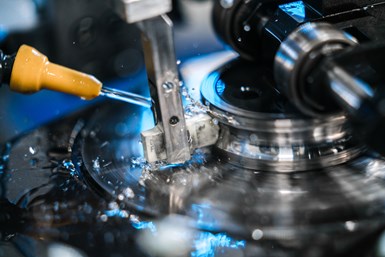Nagel Introduces Flexible Bearing Race Superfinisher
The patent pending part drive system can reportedly handle a range of part diameters without any changeover. The new system includes several industry features to make the machine more flexible and productive.
Share





Nagel Precision Inc. has a developed a series of flexible stone superfinishers for finishing inner and outer bearing races. The machines are custom designed to meet customer specifications and can be equipped with either Siemens or Allen-Bradley controls. The ultra-light finishing stone holder is mounted directly onto a heavy-duty servo oscillator and can attain oscillating speeds of up to 45 Hz. The directly coupled servo part driver can reach speeds of up to 3,000 rpm. Additionally, multiple finishing heads can be mounted to achieve the user’s desired quality and output. The custom developed superabrasive stones supposedly enhance tool life and part quality.
The new machine reportedly allows users to change from one part type to another quickly, minimizing idle time during the machine cycle. The superfinishing heads are mounted on an X and Z servo axis for automatic positioning to accommodate part diameter and thickness change. The patent pending part drive system can reportedly handle a range of part diameters without any changeover. The new system includes several industry features designed to make the machine more flexible and productive.
Related Content
-
Industry Analysis: Machining Semiconductor Components
With many machine shops anticipating long-term growth in demand from the semiconductor industry, it is worth the time to heed the advice of manufacturers who have already been servicing this end-market for years.
-
Digitalization and Done-In-One Reign Supreme at BIEMH 2024
European manufacturers may have a different balance of markets than their U.S. counterparts, but the practical challenges they must overcome are often similar — as are the solutions.
-
Grob Mill-Turn Machining Center Provides Flexible Performance
The G550T mill-turn universal machining center offers optimized milling and turning performance for a broad range of part materials in one setup.






















